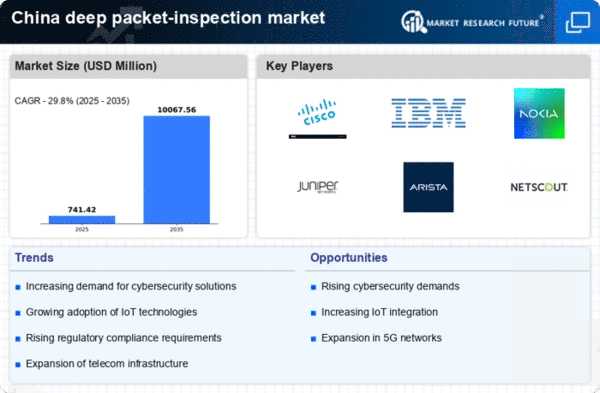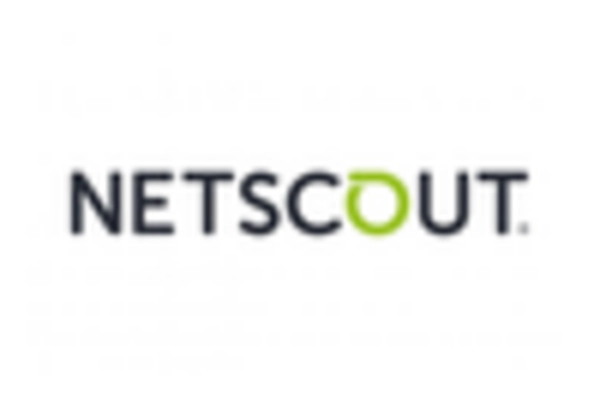Growth of Cloud Computing Services
The rapid adoption of cloud computing services in China is reshaping the landscape of the deep packet-inspection market. As businesses migrate to cloud-based infrastructures, the need for robust security measures to protect data in transit becomes increasingly critical. Deep packet inspection technologies facilitate the monitoring of data flows between on-premises systems and cloud environments, ensuring compliance with security protocols. In 2025, the cloud services market in China is expected to reach approximately $50 billion, indicating a strong correlation with the growth of deep packet-inspection solutions. This trend suggests that organizations are prioritizing the integration of advanced security measures to safeguard their cloud-based operations.
Expansion of Internet of Things (IoT) Devices
The proliferation of Internet of Things (IoT) devices in China is significantly impacting the deep packet-inspection market. With millions of connected devices generating vast amounts of data, the need for effective monitoring and management of network traffic has become paramount. Deep packet inspection technologies enable organizations to analyze data packets transmitted by IoT devices, ensuring secure communication and preventing unauthorized access. As of 2025, it is estimated that the number of IoT devices in China will exceed 1 billion, further driving the demand for deep packet-inspection solutions. This expansion presents a substantial opportunity for market players to develop tailored solutions that address the unique challenges posed by IoT connectivity.
Increasing Demand for Network Security Solutions
The deep packet-inspection market in China is experiencing a surge in demand for advanced network security solutions. As cyber threats become more sophisticated, organizations are increasingly adopting deep packet inspection technologies to enhance their security posture. In 2025, the market is projected to grow at a CAGR of approximately 15%, driven by the need to protect sensitive data and maintain operational integrity. Enterprises are investing in these solutions to detect and mitigate potential threats in real-time, thereby ensuring compliance with stringent data protection regulations. This trend indicates a robust growth trajectory for the deep packet-inspection market, as businesses prioritize cybersecurity measures to safeguard their digital assets.
Rising Regulatory Frameworks for Data Protection
The evolving regulatory landscape in China is a key driver for the deep packet-inspection market. With the implementation of stringent data protection laws, organizations are compelled to adopt technologies that ensure compliance with these regulations. Deep packet inspection solutions provide the necessary tools for monitoring and analyzing network traffic, enabling businesses to adhere to legal requirements regarding data privacy and security. As of 2025, it is anticipated that compliance-related investments will account for over 20% of IT budgets in China, underscoring the importance of deep packet-inspection technologies in meeting regulatory standards. This trend highlights the critical role of these solutions in fostering a secure digital environment.
Emergence of Advanced Threat Detection Technologies
The deep packet-inspection market is witnessing a transformation due to the emergence of advanced threat detection technologies. As cyber threats evolve, traditional security measures are often insufficient to combat sophisticated attacks. Deep packet inspection solutions are increasingly integrated with machine learning and artificial intelligence to enhance threat detection capabilities. In 2025, it is projected that the market for advanced threat detection will grow by approximately 18%, reflecting the increasing reliance on deep packet inspection technologies to identify and respond to potential security breaches. This trend indicates a shift towards proactive security measures, positioning deep packet inspection as a vital component in the cybersecurity arsenal of organizations across various sectors.
















